New words, new dialogues
It’s beautiful, our English language — fluid and expressive, colorful and lively. And it’s changeable. New words appear all the time. Consider “selfie” (a noun), “problematical” (an adjective), and “Google” (a noun that turned into verbs.) Now we have two more: “anti-vax” and “anti-vaxxer.”













